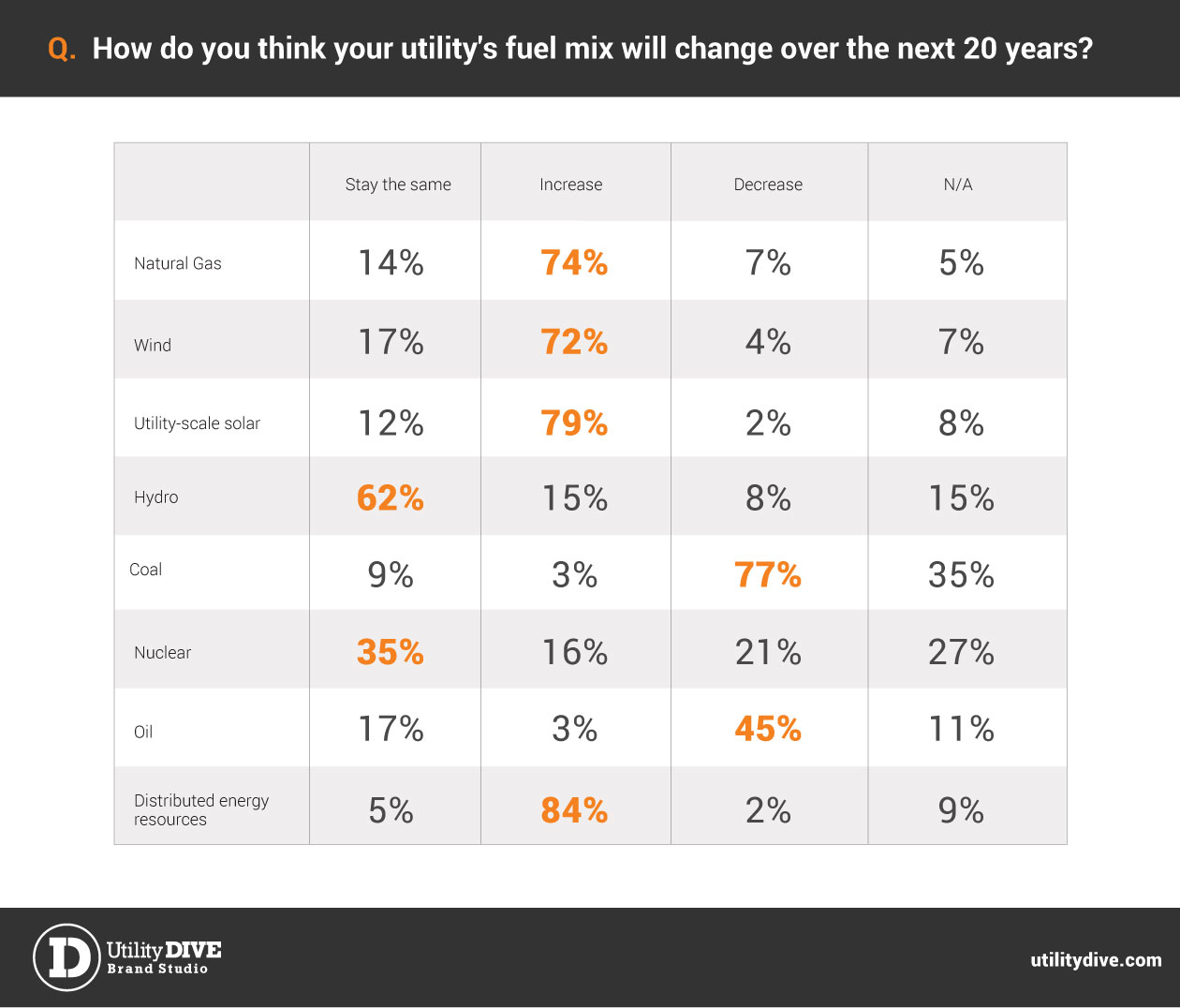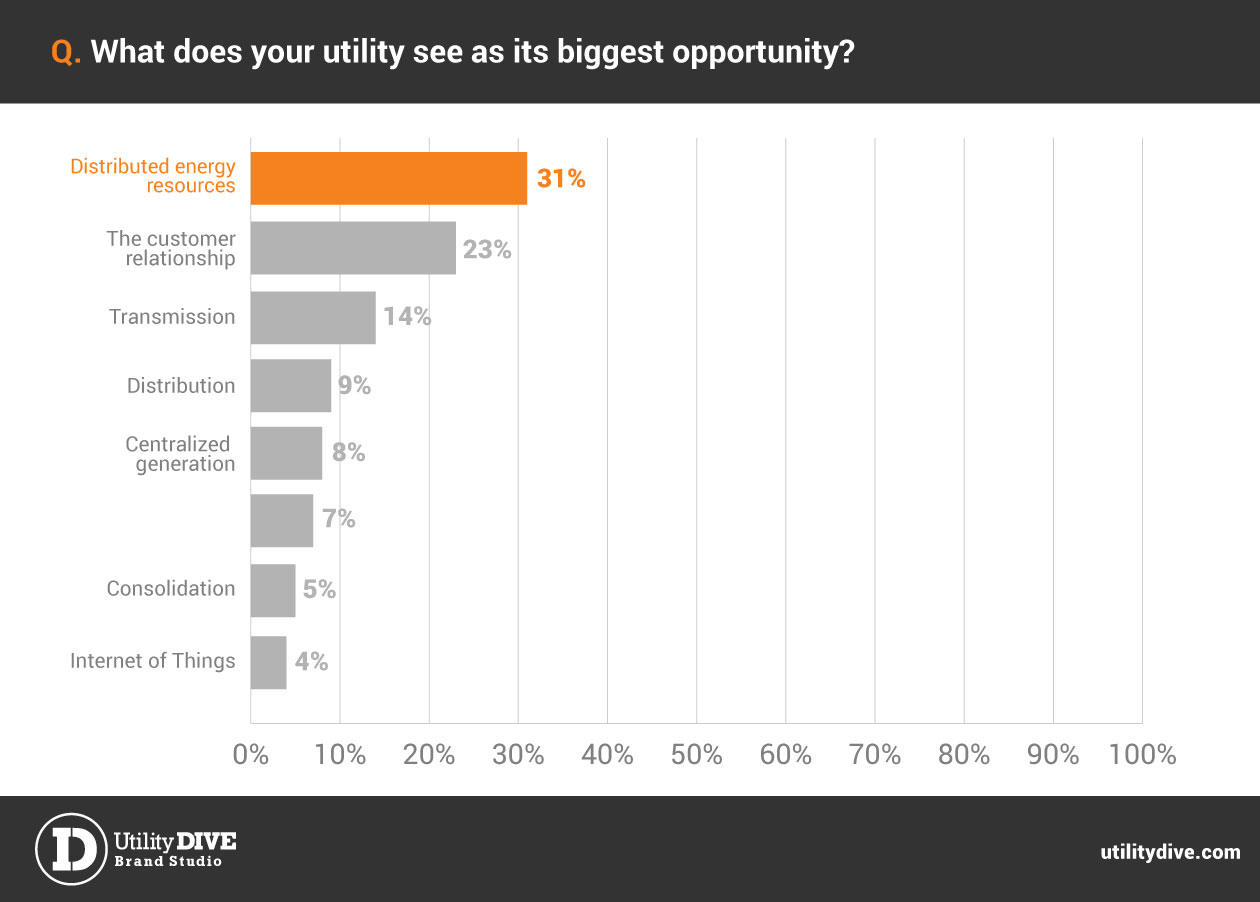
Every year (well, this is the second year), the trade website Utility Dive conducts a survey of about 400 electric utility execs across the country to find out what they think about the future of their business.
The good news about the survey this year is that many of them seem to get a very key point: distributed generation is the future. 31% of them, more than for any other category, see distributed generation as a real opportunity. The bad news, or a portion of the bad news anyway, is that 56% of the execs don’t have the slightest clue as to how to build their business around distributed generation.
Only 16% of the utility execs think nuclear power use will increase over the next 20 years; 35% think it will stay the same; and 21% think it will decrease. Still plenty of room for education there.
Anyway, I was going to write more about this, and about the other findings of the survey, but David Roberts at Grist beat me to it, and did a better job than I would have anyway. So definitely read his take on the survey here.
And you can read Utility Dive’s own summary, and download the survey, here.

So instead I’ll take a moment to talk about Citigroup’s latest report on the electricity business, which predicts that electricity storage will both boost renewables (no surprise there) and, more importantly, enable renewables to “become a true substitute for baseload generation,” as this article from ReNeweconomy puts it.
Unfortunately, Citigroup’s lawyers will no longer allow us to post links to their very expensive reports (and we don’t have this one yet ourselves anyway), so you’ll have to take our word, and the article’s word: This will be truly disruptive and, hint hint, one way all those utilities looking for a way to incorporate distributed generation into their business model can accomplish that task.
Indeed, Citigroup says electricity storage is going to hasten the end of fossil fuels altogether (Citigroup is already so down on the future of nuclear power it’s not even mentioned in the article). The bank predicts storage will become a $400 Billion (with a capital B) business by 2030, and storage costs will–as solar power costs continue to do–plummet between now and then.
Citigroup says traditional utilities relying on baseload power are at risk in six different ways–a prod to get them to change. And when mega-bucks banks like Citigroup speak, it matters. As ReNeweconomy put it,
The issue is therefore rapidly moving beyond those with a narrow focus on utilities and energy markets, it is now part of mainstream financial thinking, and because of that will have a profound influence on capital flows across the globe.
Citi says improvements in battery storage both in terms of operational performance and economic terms should expand and accelerate the trend for corporates and households to become self-sufficient in terms of electricity generation.
In other words, cheap storage is going to further accelerate already soaring rooftop solar, encourage electric cars recharged by renewable electricity, discourage fossil fuels like natural gas and oil even from peaking power uses, and obliterate coal and nuclear. Not to mention pretty much disrupt the entire “baseload” business model of most current utilities. No wonder some of those utility execs are finally starting to look around at new business models (those who aren’t are out there trying to find new arguments to continue the 20th century “baseload” model; it won’t work, guys). The question is whether they’ll act in time to save their own businesses, or whether aggressive new companies will come in and change their businesses for them by putting them out of business.
Either way, unstoppable technological advances continue to point to a nuclear-free and carbon-free future. For the present though, the critical battles to close nuclear reactors and support renewable energy standards and policies continue and remain essential if we’re going to reach that future in time to save the only planet we’ve got.
Michael Mariotte
January 28, 2015
Permalink: https://www.nirs.org/2015/01/28/some-utilities-get-it/
Your contributions make publication of GreenWorld possible. If you value GreenWorld, please make a tax-deductible donation here and ensure our continued publication. We gratefully appreciate every donation of any size.
Comments are welcome on all GreenWorld posts! Say your piece above. Start a discussion. Don’t be shy; this blog is for you.
If you’d like to receive GreenWorld via e-mail, send your name and e-mail address to nirs@nirs.org and we’ll send you an invitation. Note that the invitation will come from a GreenWorld@wordpress.com address and not a nirs.org address, so watch for it.
If you like GreenWorld, you can help us reach more people. Just use the icons below to “like” our posts and to share them on the various social networking sites you use. And if you don’t like GreenWorld, please let us know that too. Send an e-mail with your comments/complaints/compliments to nirs@nirs.org. Thank you!
GreenWorld is crossposted on tumblr at https://www.tumblr.com/blog/nirsnet




I am not reassured by the positives on nuclear.
Reblogged this on your passport to complaining and commented:
If you need some good news int eh dreary world of energy utilities, this is the re-blog for you.